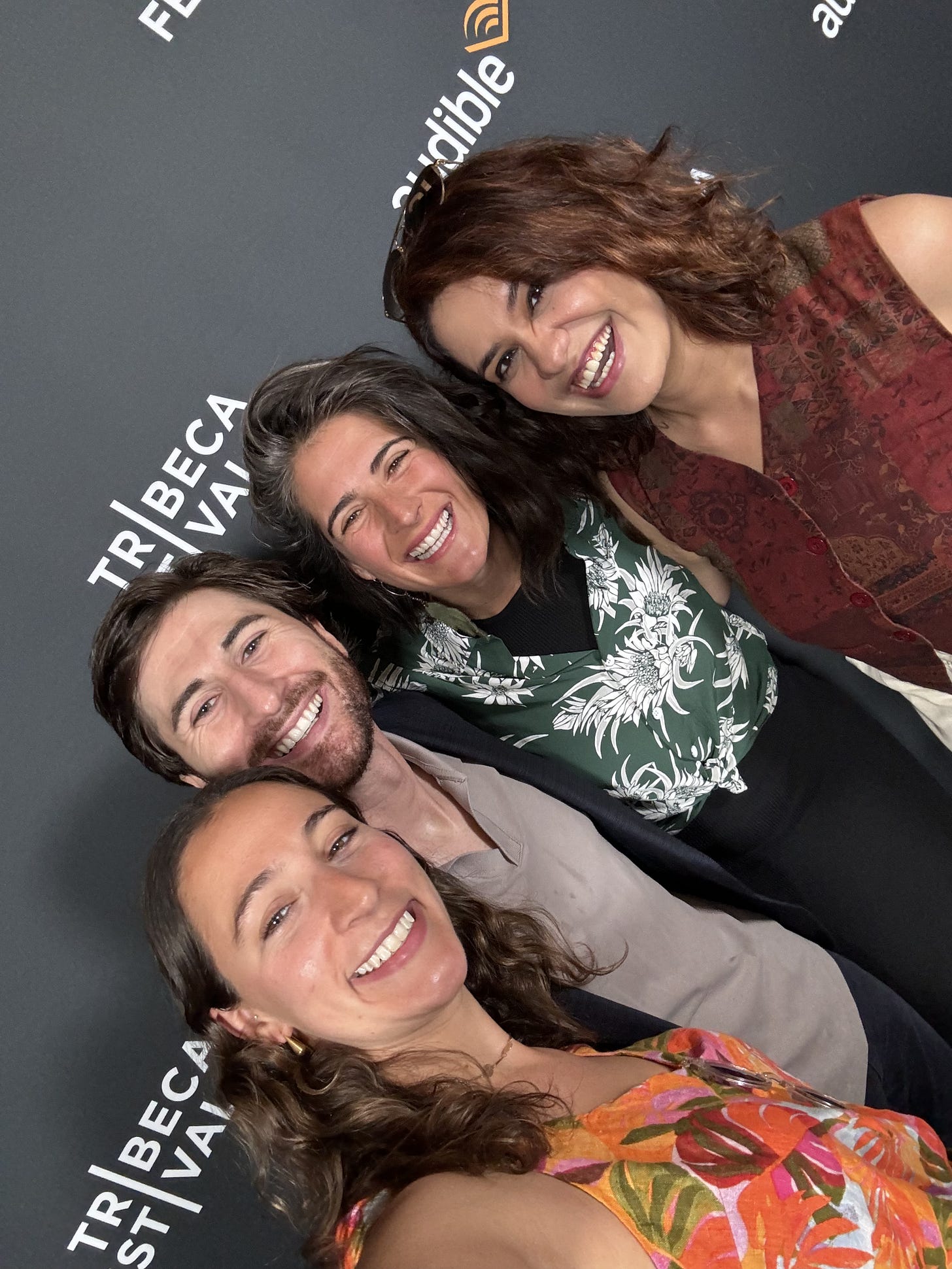🎙️Tribeca's Davy Gardner on Podcast Marketing
And the branding ideas that creators are sleeping on
Hi! Shreya here. This past week, I had the ABSOLUTE honor to attend Tribeca’s Audio Storytelling program in NYC. Being in a room with talented creators who are moved to tears with applause really reminds you what audio storytelling is all about.
Sigh.
I could go on and on about the podcast magic at Tribeca and I probably will at some point but not today.
Today, we’re hearing from Davy Gardner, the curator of the Audio Storytelling line-up, on potential for audience engagement, how Tribeca promotes independent talent, and exceptional marketing strategies.

If you’re in a rush…
When asked what element of a podcast’s branding/marketing does he think podcasts are sleeping on, Davy said:
I think that the best marketing strategies are the ones that are authentic and true to the heart of a show, and there is a magic to live performance that is hard to beat.
Let’s hear it.
🔴 Meet: Davy Gardner, curator of Tribeca’s Audio Storytelling program
(This interview has been edited for clarity and brevity. Any emphasis is mine.)
S: What are the standout marketing strategies that have impressed you from podcasts featured in Tribeca’s audio program?
🎙️ DG: One of our creators this year, Nina Porzucki, made the hilarious Tribeca Audio Official Selection, Bird Talk. It’s a fictional interview show where the guests are birds. It’s not only funny, but you also learn a lot about birds, and Nina set up a Central Park Bird Talk Bird Walk where a birder guided a group of people through the park birding. It fit perfectly into the Tribeca Audio focus on sound-rich, in-person live audio events.
S: When you’re selecting podcasts, what key elements do you look for that indicate a podcast's potential for audience engagement and growth?
🎙️ DG: When I look for selections I don’t think: “which podcast is going to be a hit?”, or “what might indicate if this podcast is going to appeal to big audiences?”. I think about what podcasts should be a hit – and then use the infrastructure of Tribeca to bring it to large audiences, whether they like it or not. I think that’s the difference between curation that’s human and curation that’s algorithmic. I look for podcasts that don’t sound like something I’ve heard before – not intentionally different, just organically original – pieces that are inventive and truthful to what they are. We don’t care as much about how we foresee a project will be perceived, but rather, what we experienced ourselves while listening. And in taking that approach, Tribeca Audio becomes a place where you can be surprised.
S: When people think of the live shows that belong at Tribeca, what qualities do you hope they imagine?
🎙️ DG: The focus will remain on highly-crafted or narrative podcasts. What I mean by that, is that we are not going to do a celebrity-driven chatcast that’s not edited. If we do a show that is interview-focused, it’s going to be something like “Death Sex & Money Live with Kara Swisher”. Then, people can also expect some of the biggest narrative shows out there, like The Daily or Criminal. There will also always be shows that are experimental and developed with Tribeca Audio and the stage in mind, like Audio Flux: Pet Sounds or In the Dark. And then, every year, we do something a little different based on what’s going on in the world. For example, this year is an election year, and I felt it was appropriate to use this space to engage with politics and the news – something that my late boss, Paula Weinstein, was extremely passionate about. I plan to always curate with an activist sensibility in her memory.
S: How is Tribeca positioning itself as a platform to catapult the growth of emerging or independent artists?
🎙️ DG: Well that’s the whole idea! The heart of Tribeca Audio is our Official Selections program which are almost entirely independent projects (with a few exceptions each year). We want our Tribeca audiences to hear work that challenges them and surprises them, and I think there’s not enough of that mentality in podcasting right now. In film circles, it’s been known for a long time that independent work is often the best work… and as our industry “grows up”, of course that’s becoming increasingly known as true in audio storytelling as well. And in terms of the business side of things, the festival is not a one-off week-long opportunity for those creators. I work with them year round. For those creators who want to find a home for their project, I set up meetings, connect them with networks, help them navigate the contracting process and negotiations with networks. Tribeca takes no fee for those services, so we are truly just advising creators on how to get the best deal for them that we can.
S: What element of a podcast’s branding/marketing do you think podcasts are sleeping on too much?
🎙️ DG: Live events! On a small scale, a few indie podcasts can bring their audiences together for a live show in a little black box theater. Everyone gets to know the shows, but also the people behind them, and that’s often a major hook! A live episode is not only a great way to vary up the sound of your feed, and to create community around your show, but also the production costs of recording live are built into the marketing spend and are paid for by ticket sales. You’re triple-dipping. Overall, I think that the best marketing strategies are the ones that are authentic and true to the heart of a show, and there is a magic to live performance that is hard to beat. As someone who’s written a lot of audio drama, I’ve always seen the tie between audio and theater.
💜 Thank you, Davy! For this interview, and all that you do. There is so much that I learned and am walking away with from the Tribeca audio experience. As the kids say - watch this space for more!
🎧 From The Desk of Tink
Everyone Knows That: The Search for Ulterior Motives is a new podcast unraveling the mystery around the internet’s favorite missing song: “Ulterior Motives,” known online as “Everyone Knows That,” which was finally sourced earlier this year . . . in porn from the ‘80s. In five episodes, this new investigative podcast finds out the true story behind the search for the song – and its creation.
Thank you for reading! Next week, Wil returns with more sparkly podcast marketing magic.
Until then, stay curios.
Shreya






Insightful and reassuring: there are people who care more about sound, narrative and originality rather than copying last year's hit. :-)